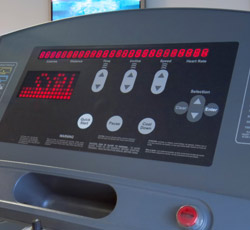How many of us have spent endless amounts of time calculating our caloric burn during exercise? We use pedometers, heart rate monitors, digital displays on cardio machines, etc. What people need to realize that it isn’t just about the calories we burn in the gym that help towards our goal of fat loss; it is also the amount of calories we burn AFTER the gym that count.
 Excess Post Oxygen Consumption (EPOC), is an increased rate of oxygen intake following vigorous activity in an effort to replenish the oxygen the body lost from exercise. During recovery EPOC is responsible for the restoration of the body to a resting state, and adapting it to the exercise done prior.
Excess Post Oxygen Consumption (EPOC), is an increased rate of oxygen intake following vigorous activity in an effort to replenish the oxygen the body lost from exercise. During recovery EPOC is responsible for the restoration of the body to a resting state, and adapting it to the exercise done prior.
The level of EPOC one experiences depends on the intensity of your workout. The harder you work out, the more energy your body will need to bring it back to the level it was prior to exercise.
"One experiment found EPOC increasing metabolic rate to an excess level that decays to 13% three hours after exercise, and 4% after 16 hours. Another study, specifically designed to test whether the effect existed for more than 16 hours, conducted tests for 48 hours after the conclusion of the exercise and found measurable effects existed up to the 38 hour post-exercise measurement." 1
There are certain variables within your workout that you can alter to get EPOC levels higher, they are as follows:
HEAVY WEIGHT TRAINING:
While performing your resistance training session, try to lift weights as heavy as possible. This will elevate the energy your body needs to repair itself. One might try doing a typical workout encompassing 3-8 rep sets at 80-90% of one rep max, rather than 12-15 rep sets of 50-60% of one rep max.
REST PERIODS:
Taking slightly shorter rest periods will force your body to work harder to recover. This extra effort exerted by your body in turn will raise your EPOC levels.
AEROBIC EXERCISE:
Aerobic Training should be done at a higher intensity than usual. This higher intensity level will lead to a shorter aerobic training session, which will actually LOWER the calorie burn during the actual session. However, we must continue to remind ourselves that even though the caloric burn will be lower during the exercise, the EPOC level will rise, which will raise the total caloric burn.
In summary, it is my opinion that people should be doing heavy resistance training three to four times a week, and one to two high intensity aerobic sessions per week.
References:
1 “Excess post-exercise oxygen consumption” Wikipedia. Wikimedia Foundation, n.d. Web.
Please consult your physician before staring any exercise regimen. The information presented in this article is in no way intended as medical advice or as a substitute for medical treatment.







